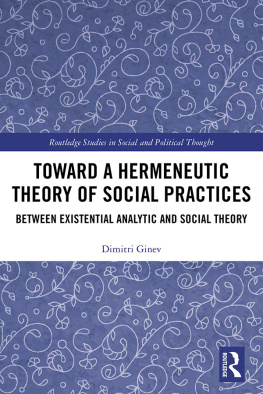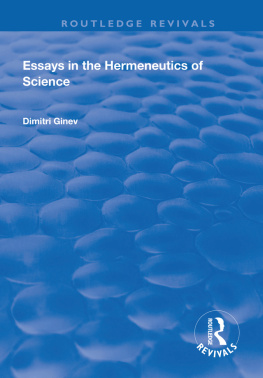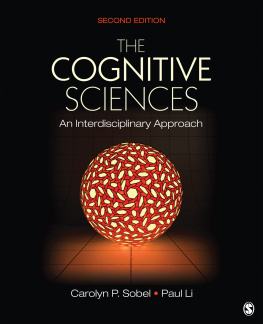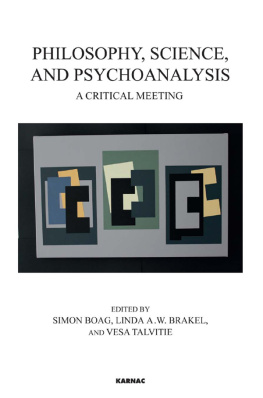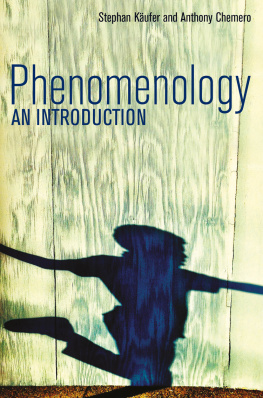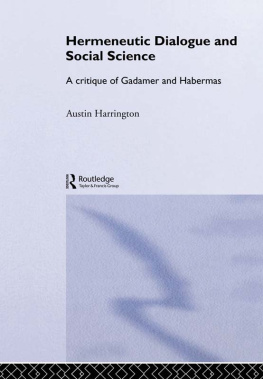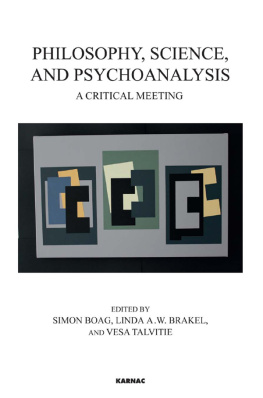The Tenets of
Cognitive Existentialism
SERIES IN CONTINENTAL THOUGHT
Editorial Board
Ted Toadvine, Chairman, University of Oregon
Elizabeth A. Behnke, Study Project in Phenomenology of the Body
David Carr, Emory University
James Dodd, New School University
Lester Embree, Florida Atlantic University
Jos Huertas-Jourda, Wilfrid Laurier University
Joseph J. Kockelmans, Pennsylvania State University
William R. McKenna, Miami University
Algis Mickunas, Ohio University
J. N. Mohanty, Temple University
Dermot Moran, University College Dublin
Thomas Nenon, University of Memphis
Rosemary Rizo-Patron de Lerner, Pontificia Universidad Catlica del Per, Lima
Thomas M. Seebohm, Johannes Gutenberg Universitt, Mainz
Gail Soffer, Rome, Italy
Elizabeth Strker, Universitt Kln
Nicolas de Warren, Wellesley College
Richard M. Zaner, Vanderbilt University
International Advisory Board
Suzanne Bachelard, Universit de Paris
Rudolf Boehm, Rijksuniversiteit Gent
Albert Borgmann, University of Montana
Amedeo Giorgi, Saybrook Institute
Richard Grathoff, Universitt Bielefeld
Samuel Ijsseling, Husserl-Archief te Leuven
Alphonso Lingis, Pennsylvania State University
Werner Marx, Albert-Ludwigs Universitt, Freiburg
David Rasmussen, Boston College
John Sallis, Boston College
John Scanlon, Duquesne University
Hugh J. Silverman, State University of New York, Stony Brook
Carlo Sini, Universit di Milano
Jacques Taminiaux, Louvain-la-Neuve
D. Lawrence Wieder
Dallas Willard, University of Southern California
The Tenets of
Cognitive Existentialism
DIMITRI GINEV

Ohio University Press, Athens, Ohio 45701
ohioswallow.com
2011 by Ohio University Press
All rights reserved
To obtain permission to quote, reprint, or otherwise reproduce or distribute material from Ohio University Press publications, please contact our rights and permissions department at (740) 593-1154 or (740) 593-4536 (fax).
Printed in the United States of America
Ohio University Press books are printed on acid-free paper 
20 19 18 17 16 15 14 13 12 11 5 4 3 2 1
Library of Congress Cataloging-in-Publication Data
Ginev, Dimitur.
The tenets of cognitive existentialism / Dimitri Ginev.
p. cm. (Series in Continental thought)
Includes bibliographical references (p. ) and index.
ISBN 978-0-8214-1976-2 (hc : alk. paper)
1. SciencePhilosophy. 2. ScienceResearch. 3. Hermeneutics. 4. Philosophy and science. 5. Existential phenomenology. 6. Feminist criticism. I. Title. II. Series.
Q175.G5224 2011
507.2dc23
2011018467
To Tomy Tantiloff-Antonova
(18921988)
CONTENTS
2. Is the Existential Conception of Science a Kind
of Philosophy of Science?
ACKNOWLEDGMENTS
In writing this book, I benefited from chances to discuss my ideas in several settings: University of Pittsburgh, Penn State University, Catholic University of America, Humboldt University in Berlin, University of Melbourne, Ruhr-University in Bochum, University of Oslo, and Western Kentucky University. For conversations through the years that have provoked me to develop the project of cognitive existentialism, I am indebted to Azarya Polikarov, Joseph Kockelmans, Patrick Heelan, Robert Cohen, Babette Babich, Oswald Schwemmer, Nicholas Rescher, Gernot Bhme, Robert Crease, Peter Janich, Pierre Kerszberg, Howard Sankey, Hans-Peter Krger, Hans Rainer Sepp, Arvin Voss, Joseph Margolis, John Rundell, Cassandra Pinnick, and Jrgen Mittelstrass. I am especially grateful to Ted Toadvine, editor of the Series in Continental Thought, for encouraging me. For her advice and support, I thank Nancy Basmajian of the Ohio University Press. I was fortunate to profit from Deborah Wisemans remarkable skill and benevolence in improving stylistically the text of this book. I express my deep gratitude to her.
Modified versions of , published in fall 2010 by Telos Press Publishing (New York).
INTRODUCTION
1. HERMENEUTIC VERSUS OBJECTIVIST CONSTRUAL OF THE WORLD
I will introduce the concept of cognitive existentialism against the background of the distinction between a hermeneutic and an objectivist understanding of the world. The latter is traditionally related to science, whereas the former is conceived as inherent in forms of artistic and religious experience. Yet if a dimension of interpretative understanding of the world is attributed to the kind of realist attitude adopted by the practitioners of scientific research, then the idea for a hermeneutic realism would seem plausible and reasonable. In fact, hermeneutic realism is a term coined by Patrick Heelan (1983a) for the construal of the world that ensues from sciences readable technologies. The world that is ready-to-hand in the process of scientific research is constituted as manifolds of meaningful texts by means of readable technologies. In this formulation, reading and constitution are intimately related. Texts are not written before initiating a research process. They are artifacts of doing scientific practices, caused to be written by nature on human instruments within the dynamics of the changing configurations of such practices. Hermeneutic realism stresses that the world is always already meaningfully constituted, being thereby a textualized and readable reality. Heelan (1983b) argues that the texts brought into play by scientific practices of observation, instrumentation, experimentation, calculation, classification, measuring, and so on serve as codes for the perceived objects in normal scientific everydayness. Being subjected to an ongoing reading, the reality of scientific research is always in a process of constitution. This claim is to be clearly differentiated from the claim that the reality of scientific research is constructed by theoretical idealizations.
There is no kind of scientific objectification (based on theoretical idealizations) that might occur beyond a configuration of practices. By the same There is no theoretical world constituted outside a horizon of possibilities projected by an interrelatedness of scientific practices. Furthermore, the particular mode of being-in-a-theoretical-world (say, the mode of existence of a scientific community) does not amount to its being determined by a conceptual framework since the latter is always situated in practices whose dynamics might revise it. The open horizon of interrelated practices transcends each and every conceptual framework, exposing it thereby to possible extensions and modifications. The mode of being-in-a-theoretical-world is rather the way of being involved in theoretical practices like eliminating ad hoc hypotheses, constructing data-models for interpreting a system of partial differential equations, carrying out an experiment for verifying the validity of a theoretical prediction, modifying a mathematical formalism for the sake of achieving better conceptual homogeneity of a theory, or repeating an experiment with the purpose of integrating a new explanatory scenario into an established theory.
Hermeneutic realism is opposed to the objectivist construal of the world whose kernel is epistemological representationalism.out something else (24). Accordingly, the mind, which designs practices, is not the place of representing what is going on in the world, but a source of constant intervening by means of which what is out there gets provoked.
Next page

